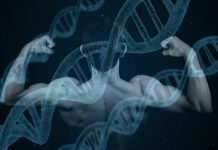Protein serves mainly as a building material for the construction and maintenance of body tissues. Although not primarily a source of energy (as opposed to fats and carbohydrates), in the event of energy shortages, the gluconeogenesis process can create the necessary energy (in the form of glucose) also from protein. In addition, proteins also have other functions (transport, defense, muscle movement… ).
Proteins consist of amino acids (AK), their production in the body depends on dietary intake. In the digestive tract, the consumed proteins can be broken down into amino acids and later synthesized again into the necessary proteins, with the exception of the essential amino acids that always need to be taken in the diet.
The protein sources are divided into two groups:
- animal sources (meat, fish, dairy, egg white)
- plant sources (especially legumes, cereals, nuts, seeds, vegetables)
The value of a food as a protein source is determined by the following properties:
- proportion in energy value – ie how many other macronutrients (fats, carbohydrates) does the food contain alongside proteins). The purest protein sources are lean poultry meat and egg white. Plant sources have a lower protein content.
- completeness and usability of food in terms of amino acid profile (animal sources are best)
- digestibility, which includes multiple parameters:
- how much energy does the body have to spend on food digestion. Animal foods are more difficult to digest than plant ones, but this doesn’t apply to specially prepared concentrated animal proteins (isolate, hydrolyzate)
- the amount (%) of protein that is actually processed in the body, therefore, the overall quality of the protein involves both usability and digestibility (e.g. PDCAAS / DIAAS)
- absorption rate – an example of a fast protein is whey concentrate (especially a hydrolyzate), an example of slow one is casein.
The standard recommended protein intake (RDI) in the diet is about 0.8g / kg LBM (lean body mass, ie overweight should not be counted in). For active athletes (especially for strength athletes) the protein intake need to be increased due to higher demands for tissue regeneration.
Energy contained in 1g protein: 4kCal
Back: Nutrition















